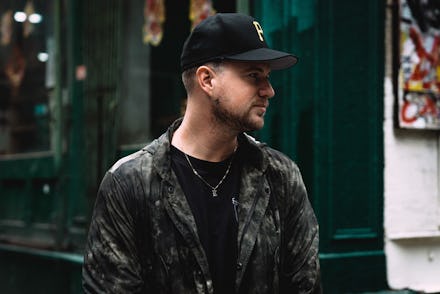John Geiger’s sneakers sell out in minutes — but as his success grows, so does his anxiety

Sneaker designer John Geiger's most recent release, the cream colorway version of the minimalist high top sneaker he's best known for, sold out in just four minutes. (If you're lucky, you can find a pair on a resale site, where the $350 shoes are going for an average of $700.) Geiger's acclaimed sneakers have been worn by rappers, athletes, and sneakerheads including 2 Chainz, Rich the Kid, and Iman Shumpert — yet even as his success continues to rise, the designer's anxiety has remained a constant in his life.
Recently, Geiger has begun to open up about his mental health struggles, including in the short film Blood & Sweat Equity that was shared alongside with the designer's latest sneaker release on May 30. The video features Geiger wrapped in a plastic bag and suffocating as spiders crawl over him. Glimpses of his shoes can be seen, but the video, as Geiger tells Mic, was meant to be primarily a creative way for him to express how anxiety makes him feel, not an ad for his products.
"I don't like speaking about [my anxiety] so the best way for me to do it is creatively," he explains during our chat over the phone. "I think that our [future] rollouts — maybe not every release, but every other release — will be a little more personal the way that one was."
Although the video was linked to the rollout of Geiger's sneaker drop, it was essential to him that there was a clear distinction between the product and the clip's message. Originally, the video featured more images of the sneakers, but the designer chose to take several of them out to keep the focus on the video's message about anxiety.
"It really bothered me that the video was going to look like an ad," Geiger explains. "It bothered me that I was going to tell about this really personal thing and that it was Mental Health Awareness Month, and like, we were showing shoes. I had to take a step back."
To come up with the concept for the video, Geiger enlisted the help of Camille Kane, a visual artist and director. He recalls mentioning Kanye West's "Flashing Lights" video — in which the artist isn't shown until the very end — to Kane, explaining that he wanted his own clip to have a similar vibe. After several lengthy conversations, Geiger and Kane landed on an idea, making an artistic video that felt both personal and universal in its depiction of mental illness.
Kane, Geiger explains now, was able to perfectly identify what his anxiety feels like: suffocation. It's an experience that hasn't gotten better even as he's gained more success in his career, he notes. "I'm pretty sure that everyone thinks anxiety will get less and less [intense] when you get bigger, but actually it gets worse," Geiger says. "There's just way more stuff going on now."
Geiger, of course, is far from the only artist who has used creative means to express their experiences with mental illness. Demi Lovato has made songs and a documentary detailing her issues with depression and substance abuse, Kendrick Lamar wrote about his depression on the song "u" from the album To Pimp a Butterfly, and actor Gabrielle Sidibe opened up about her struggles with mental illness in her memoir This Is Just My Face: Try Not to Stare, just to name a few.
The more people with large platforms who talk about mental health, the better it is for everyone. When "I spoke up about some issues I had personally a couple of months ago, I realized how many people connected — I got so many DMs and emails," Geiger recalls. "I think when people know about me, and my personal issues, then people relate more."
Deciding to publicly discuss his anxiety through forms like the video has helped him, too. "For me, when I finally spoke up and I saw that people related," the designer says, "that was when everything turned around."